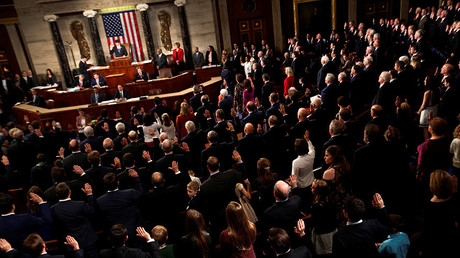
US House of Representatives approves new sanctions against Russia

The House of Representatives has voted overwhelmingly to pass new sanctions against Russia, and require congressional approval before US President Donald Trump can ease or remove existing ones. The bill also includes sanctions against Iran and North Korea
Lawmakers voted 419-3 to approve legislation seeking to punish Russia over a host of issues, including its alleged meddling in the 2016 presidential election, its support for the Syrian government and alleged support for the rebels in Ukraine, as well as Crimea’s accession to Russia.
“It empowers Congress to review and disapprove of any sanctions relief,” said Rep. Ed Royce (R-California) on the House floor, ahead of the vote.
The sanctions target a wide array of entities and individuals – including Russia’s energy sector, banks and weapons manufacturers, as well as those whom the US has accused of interfering in the US presidential election through hacking and otherwise.
To reverse each of the sanctions, the administration would have to provide evidence and certify that the conditions that prompted them have been removed.
Having secured well over two-thirds of the legislature’s votes, the bill is effectively veto-proof, meaning lawmakers have enough votes to override any potential veto by the president.
However, the following day Huckabee Sanders said the president was going to “study that legislation and see what the final product looks like.”
“While the President supports tough sanctions on North Korea, Iran and Russia, the White House is reviewing the House legislation and awaits a final legislative package for the President’s desk,” she said in a statement as cited by Reuters.
The White House opposed a similar bill which the Senate passed last month, saying that it would erode the president’s authority to determine foreign policy.
Russia has repeatedly denied any collusion with the Trump campaign or interference in the 2016 election.
Fresh sanctions would prove detrimental not just to the US and Russia, but other countries too, Kremlin spokesman Dmitry Peskov said Monday.
“If Trump signs the sanctions bill, he will not calm down his enemies – they desire his impeachment. But he will inflict double damage – to relations with Russia and the European Union at the same time,” Russian senator Aleksey Pushkov said.
EU authorities have urged US lawmakers to coordinate their anti-Russian actions with European partners. “Unilateral measures” could undermine transatlantic unity and have “unintended consequences,” the European Commission warned in a special address on Monday.
The legislation aims to introduce individual sanctions for investing in Russian energy projects. It also outlines steps to hamper construction of Russian company Gazprom’s Nord Stream 2 gas pipeline project.
“We are concerned the measures discussed in the US Congress could have unintended consequences, not only when it comes to Transatlantic/G7 unity, but also on EU economic and energy security interests,” the commission stated.
Germany and Austria in particular spoke out against punitive actions by the US following the approval of the bill by US senators last month. A joint statement issued by German Foreign Minister Sigmar Gabriel and Austrian Chancellor Christian Kern noted the need for the 28-member bloc to expand its energy supply network.
“We can’t accept the threat of illegal and extraterritorial sanctions against European companies,” the politicians charged. “Europe’s energy supply is a matter for Europe, and not for the United States of America.”
The new measures introduced by the US were primarily about “selling American liquefied natural gas and ending the supply of Russian natural gas to the European market,” the officials added.
Ahead of US lawmakers clearing all potential hurdles for the bill, a number of American multinationals – including ExxonMobil, General Electric and Boeing, as well as MasterCard and Visa – raised concerns that the punitive measures will ultimately harm their interests, rather than those of the Kremlin.
After pressure from US energy companies that want to do business in Russia, the legislation was amended to allow American businesses to work with Russian entities on certain oil and gas projects outside of Russia as long as they don’t involve a sanctioned Russian individual or company owning a 33 percent stake or more.
Source:rt.com


